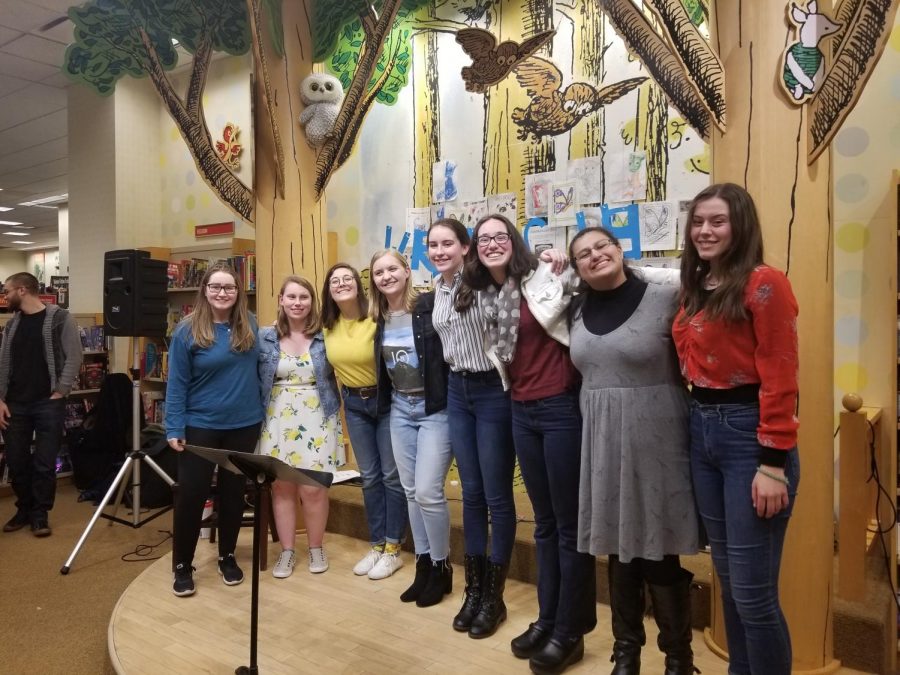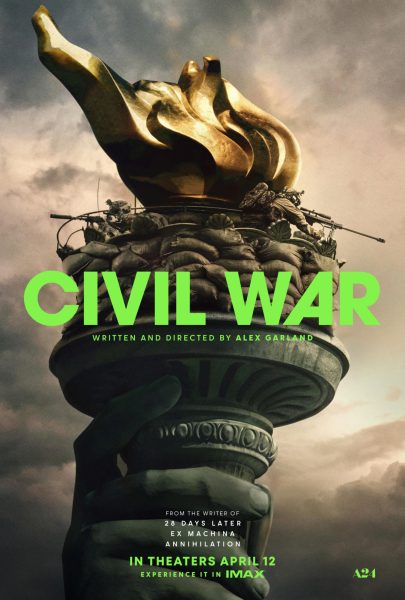Competitive creative writing is valuable, powerful
Friday, April 5th, 7:40 p.m.: I’m sitting on a kid-sized stool in the children’s section of the Geneva, Illinois Barnes and Noble. I’ve browsed the shelves and downed the best free sample of a Starbucks Frappuccino consumed in my life, and it’s time to get started.
After weeks of anticipation and dread and a week of writing preparation, the moment has arrived. I step onto the cutely decorated children’s stage and lose the traditional round of Rock, Paper, Scissors. My opponent instructs me to go first; I grab the microphone.
With trembling knees and shaky hands, I read my poem.
To anyone who has ever written anything, the terror is familiar, almost near-and-dear to one’s heart. It’s the fear of poor feedback—of putting thoughts onto paper and out into the world, where they can’t be taken back, and receiving dislike, distaste, or—worst of all—disdain.
But anyone who has ever written anything also understands the power of words. There is a magic present in transforming the abstract ideas of one’s mind into symbols on paper that mean something to other people.
Stories bind together our lives. Large or small, grand or ordinary—stories thrive everywhere. Humanity has been telling stories since our inception. One could even argue that the capacity to capture a story is an integral part of the human experience. Creative writing harnesses all of that power to tell one’s own unique experience.
In short, creative writing—whether in the form of poetry or prose—expresses individuality. Your writing embodies you.
Which, of course, then makes competing in creativity absolutely terrifying. One could, in this lens, interpret a creative writing competition—especially one in which a contestant personally presents their work—as a competition of selves, with a potential ending of utter, devastating embarrassment.
So, why do it?
Firstly, writing is an integral communication skill in any setting of today’s modern age. We write to each other all the time, all day long. Not only do we write argumentative English papers or document-based-question essays, but also emails and social media posts. Texts count as writing. Every job in America today will require some form of written communication—from the job application to the daily tasks of a chosen occupation.
We are a verbal society and most of our communication happens via the spoken or written word. Communication is vital to success, and the only way to improve communication is—as in many things—to practice.
Therefore, any kind of writing improves the rest of one’s writing. Why not write creatively? It can only better writing ability.
Secondly, creative writing is a valuable outlet. Contrary to popular belief, creative writing isn’t just telling a made-up story in a far-away land—though one could easily find countless examples of that type of creative writing making its authors millions, from J. K. Rowling to Stephen King to Hollywood screenwriters, such as those, say, of Marvel’s multi-billion-dollar franchise. Creative writing is any form of written word that expresses one’s personal ideas.
So, that persuasive essay you wrote for English? Creative writing.
That editorial in the news today? Creative writing.
That amazing Super Bowl advertisement you still can’t get out of your head? Actors playing out—you guessed it—an author’s creative writing.
“While people should make decisions based on logic, it’s in our nature to use our emotions when making decisions as well,” said Mr. Whitman, West’s Write Place Coordinator. “Of course, marketers and advertisers know this and appeal to emotions all the time to persuade people to buy this or support that, so creative writing persuasive arguments are very apropos to persuasion in professions like those and for the good-old-fashioned way we try to win hearts and minds in our personal lives.”
Creative writing, in short, is the best way to showcase opinions—to share one’s voice. You are unique—no one in the history of humanity has ever been exactly like you or will ever be exactly like you. The power to move mountains lies in creative writing. We may feel powerless at times but our writing is not. Give the gift of your personal story.
Logic then demands that if writing requires practice and remains a necessary life skill in today’s information age, why not compete?
I am an unskilled public speaker, and crowds make me nervous. I went to my first creative writing competition, Write Club, anyway. Mr. Whitman describes this club as a place where “three to five pairs of creative writers write pieces about opposing topics and deliver them to a live audience…something like an ironically edgy Story Slam.”
“Write Club is the whetstone that grinds writers’ blades of persuasion,” said Mr. Whitman. “[I]t is a low-commitment opportunity for student creative expression. Combatants only need to write an approximate five minute ‘piece’ and then deliver it at the event. So, it is most valuable for students who are involved in other activities or athletics who don’t have much time to commit to other, more demanding clubs or teams. Definitely writing and speaking skills are honed from performing in Write Club, but more importantly, confidence in articulating your own voice and style is the best benefit for combatants.”
And my personal experience at Write Club proved Mr. Whitman correct. While getting onto that tiny kids’ stage was nerve-wracking—despite the friendly atmosphere consisting of enthusiastic audience members and the familiar comforts of a bookstore—I felt far more confident after speaking.
My knees wobbled and my hands shook and adrenaline raced through my veins and I’d stumbled on some words, but I’d done it. I spoke, and I delivered.
And the audience—bless them—applauded.
Competitive creativity matters—it lends one an outlet “to express themselves…in their own authentic voice,” as Mr. Whitman stated. My participation in Write Club helped me to grow in persuasive abilities, as I had to argue for an abstract concept—chaos—in poetry, and the performance improved my confidence in public speaking. These valuable results all stemmed from a willingness to try something new—in a supportive and low-stakes environment.
So get out there and write. Share your voice—you may be surprised in how far creativity can take you.

Ellie is The Glen Bard's Editor-in-Chief and a senior at Glenbard West. This year is her third on the Editorial Board. She plays field hockey and chess,...





